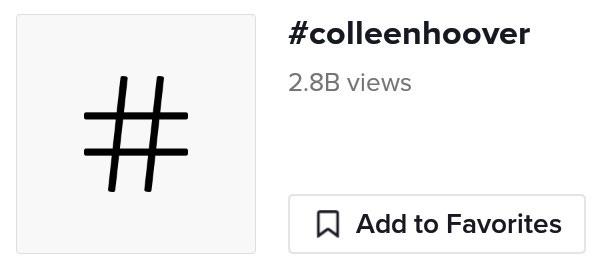what does the glorification of abuse in romance novels mean for young readers?
after colleen hoover
This article will focus on Colleen Hoover’s [negative] effects on the romance publishing industry, if you can not handle scrutiny of her work, I recommend you proceed with caution, but proceed nonetheless.
In Betty Smith’s coming-of-age novel, A Tree Grows In Brooklyn, readers follow the story of Francie Nolan and her family as they navigate through the effects of poverty, substance abuse, death, and assault. Francie doesn’t truly know what love is due to her mother, she constantly confuses the feeling of being needed with being loved. While today’s Colleen Hoover readers may not all have complicated relationships with their mother as Francie does, parallels can most certainly be drawn with how reading Colleen Hoover in your most formative years defines your perception of love.
The majority of her readers are young, teenage girls, and as of late, she’s grown an immense audience on TikTok.
Hoover’s publicist, Ariele Friedman, herself even says that in recent years, the margin for romance novel readers has widened from the previous 35-54 age range to the now 18-54 age range. [1] Yet how ethical is this if the most popular “romance” novels are just restructured glorifications of abuse?
In an interview with Vulture, Hoover states that the book she’s most proud of is It Ends With Us [2], arguably her most popular book, as well. She wrote the book in the hopes of gaining a better perspective of her mother’s relationship with her abusive husband, and how she managed to persevere through it. While nuance is most certainly important, you would expect that Hoover, seeing her mother go through that, would be more inclined to explore the dynamics of abuse rather than turn it into something that causes readers to yearn for such dynamics.
With how romance novels on their own is a much-maligned subject (mostly attributed to their status as “female reads” and how society scrutinizes everything associated with women and femininity– but that’s for another day), Hoover’s questionable writings don't help their reputation.
Just from a few hours of research, I’ve found out that one of her main character’s name is Lily Blossom Bloom, and she just happens to run a flower shop, oh, and she happens to have Ellen DeGeneres – out of all people – as her childhood hero, even to the point of naming her child “Dory” after a character DeGeneres voiced. Lily also continues to co-parent with her abuser, despite having the means to completely drop him. And of course, there’s…
But my main problem with her writings is how it’s entirely unethical to market abusive relationships, and have attempted rape scenes in books passed off as “dark romance” or God forbid, even just “romance.” And it’s not only the fact that she’s passing it off as such, it’s the fact that she knows her audience is young (and believe me, she knows [3] ), and continuing to do it, perhaps with even more enthusiasm.
I’d like to end this article with a warning, that if you continue, or want to start reading Colleen Hoover, to take into heavy, heavy consideration the topics in which she writes and the manner in which she does so. A 1-star review on Goodreads for It Ends With Us writes,
“It reduces domestic abuse to a lovers quarrel and presents a tactless caricature of the realities of abuse. I can acknowledge this may not have been the intention, but the elaboration in the author's note does not absolve this book of its reckless and irresponsible marketing.” [4]
[1] Deanna Schwartz & Meghan Collins Sullivan, “Gen Z is driving sales of romance books to the top of bestseller lists”, NPR, August 29 2022
[2] Carly Lane, “Colleen Hoover Picks Her Riskiest, Buzziest, and Most Romantic Novels”, Vulture, October 25 2022
[3] Deanna Schwartz & Meghan Collins Sullivan, “Gen Z is driving sales of romance books to the top of bestseller lists”, NPR, August 29 2022





